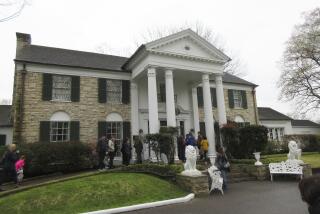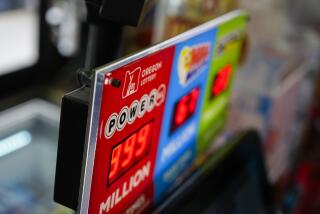Huge Prize Was Phony; Pleasure of Helping Convict Crook Isn’t
- Share via
For more years than she could remember, Elma Umpleby, a 91-year-old pensioner from Cottage Grove, Ore., had been entering her name in magazine subscription sweepstakes, but never won a dime, much less a million.
In January of 1996, however, a telephone call to her home changed her fortune--or so she thought.
Umpleby was told she had just won $1 million in the American Family Publishers sweepstakes, the one promoted by entertainers Ed McMahon and Dick Clark.
The man who called was an impostor, however. He had no connection to the giant magazine distribution company based in Jersey City, N.J.
Umpleby was instructed to wire $2,500 by Western Union--no checks please--to Los Angeles “to guarantee me the money,” she later would testify.
Although mildly suspicious, she complied, she said, because “I guess I was money-hungry.” Soon after leaving the Western Union office, however, Umpleby realized she had been scammed.
Someone else might have been too embarrassed to admit to being fleeced out of $2,500 by a stranger, but not Umpleby. She confided in a friend and together they set a trap for the con man by installing a recording device on her telephone. Should he call again, they would have his voice on tape to turn over to the police.
He did call back a few days later, this time asking for $3,000 more. Umpleby kept him talking for as long as she could while the recorder captured their conversation. Her amateur detective work paid off.
Her recording was one of seven audiotapes played before a Los Angeles federal court jury that Wednesday convicted Ray Prince, a singer and guitarist, on 15 counts of mail and wire fraud.
Prince was accused of using a variety of voices and bogus identities to bilk Umpleby and other elderly contestants out of more than $200,000.
Although the amount of money involved pales in comparison with many other telemarketing scams, it is one that has been imitated increasingly nationwide despite countermeasures by law enforcement agencies and consumer groups.
Victims like Umpleby are told they must wire several thousand dollars or more for taxes, lawyers or administrative fees before they can receive their contest windfall.
When arrested by FBI Agent Patrick M. Conley at a Hollywood hotel in October, Prince had a trove of bogus and stolen documents, including the driver’s license and birth certificate of a lawyer whose identity he used as his own in calls to victims.
In the car he was driving, FBI agents found the names and phone numbers of about 1,300 elderly persons from around the country, a “sucker list,” as it is known in telemarketing fraud circles. It included the names of the victims in the case. Next to each victim’s name was inscribed the phony name Prince allegedly used when calling their homes.
Also seized were mock-ups of American Family Publishers fliers and checks, along with receipts for a toll-free telephone number and a post office box to which victims were directed.
Among those testifying against Prince was a young woman who was arrested when she arrived at the home of one of his targets to pick up money.
Lisa Carreau said Prince would send her and others to the Western Union office to pick up the money wired by his victims. She listed the aliases he used and described how he would change his voice for each phony name.
Prince, who fired his court-appointed lawyer midway during the trial and wound up representing himself, virtually admitted using false identifications and picking up money wired by the victims. But those actions do not constitute mail or wire fraud, he insisted in his closing argument to the jury.
He also questioned why the prosecution had not called expert witnesses to verify that it was his voice on the tape recordings and that his handwriting appeared on the “sucker list.”
Assistant U.S. Atty. Ellyn M. Lindsay said the evidence against Prince was overwhelming, and that Prince’s voice on the tape recordings was unmistakable.
The jury deliberated less than a day before finding Prince guilty on all 15 counts.
More to Read
Sign up for Essential California
The most important California stories and recommendations in your inbox every morning.
You may occasionally receive promotional content from the Los Angeles Times.













